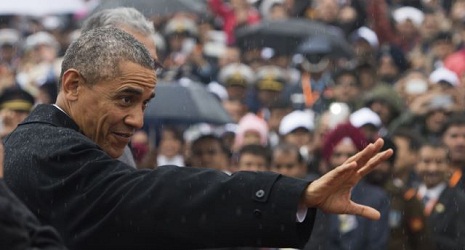Obama said he would "look at all additional options that are available to us short of military confrontation and try to address this issue. And we will be in close consultation with our international partners, particularly European partners."
The European Union called an emergency meeting of its foreign ministers on January 29 to discuss the situation.
The United States and EU have imposed sanctions on Russia over its seizure of Crimea from Ukraine last March and its support for the separatists who hold parts of the Donetsk and Luhansk regions.
The rocket attacks on Mariupol came a day after the senior separatist leader in Donetsk said rebels would seek to take control of the entire province and would no longer initiate peace talks with Kyiv.
The conflict has killed 5,000 people since April.
Deadliest Period
The United Nations said on January 23 that at least 262 had been killed in the previous nine days, making it the deadliest period since a 12-point peace plan including a cease-fire was agreed in the Belarusian capital, Minsk, on September 5.
Fighting continued on January 26, with the Ukrainian military saying at least seven of its soldiers had been killed and 24 wounded in the previous 24 hours.
Military spokesman Vladyslav Seleznyov said rebels had fired on government positions or other targets more than 100 times.
Seleznyov said fighting was at its most intense around the town of Debaltseve, a key road junction between Donetsk and Luhansk that the rebels have vowed to encircle.
The separatist offensive came despite an agreement reached by the foreign ministers of Russia, Ukraine, Germany, and France on January 21 for government troops and the rebels to pull heavy weapons back from a separation line established under the Minsk deal.
Ukraine held a day of mourning on January 25 after the Mariupol attack, which President Petro Poroshenko called a "crime againt humanity."
Obama blamed "separatists with Russian backing, Russian equipment, Russian financing, Russian training and Russian troops" for the escalation of the situation in eastern Ukraine.
Latvian Foreign Minister Edgars Rinkevics tweeted that the attack on Mariupol "breached the Minsk agreements," and added: "Russia [is] fully responsible to stop them, if not more isolation & sanctions to come."
Donald Tusk, the former Polish prime minister who is now president of the European Council, used language recalling the eve of World War Two that conveyed both fierce condemnation of Russian President Vladimir Putin and criticism of recent EU talk of easing sanctions against Moscow.
"Once again, appeasement encourages the aggressor to greater acts of violence. Time to step up our policy based on cold facts, not illusions," Tusk said on Twitter after a telephone conversation with Poroshenko following the Mariupol attack.
German Chancellor Merkel called the attack on Mariupol "a clear and totally unjustifiable violation of the cease-fire" in telephone calls with the presidents of Ukraine and Russia on January 25, and asked Putin to prevent further escalation.
Ambassadors to the Ogranzation for Securoty and Cooperation in Europe were to hold a special meeting in Vienna on January 26 to discuss the need for further peace consultations between representatives of Ukraine, Russia, the OSCE, and the other signatories of the Minsk agreement -- a reference to the Russian-backed rebels.
More about:















































